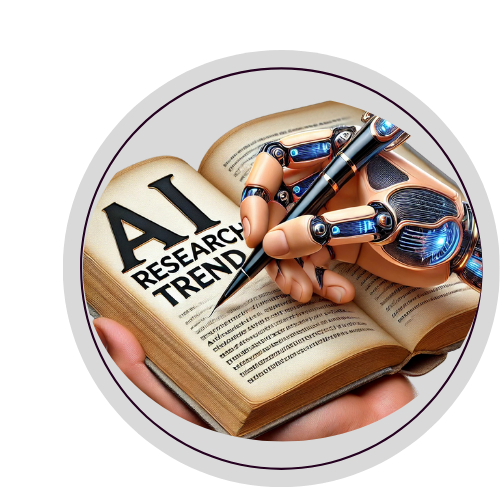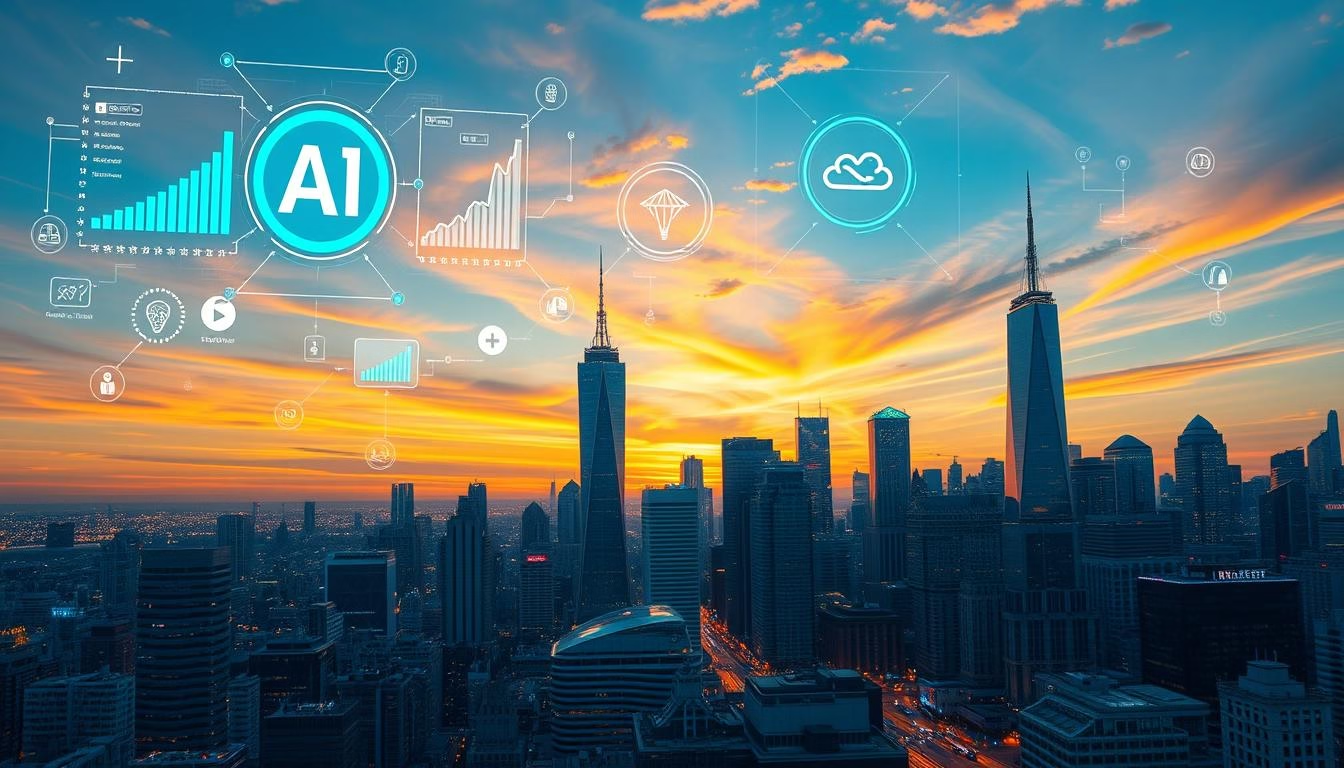The global AI industry is on the verge of a major change. From 2025 to 2030, the market is expected to grow rapidly. Companies from all sectors are racing to adopt these new technologies.
They want to use AI to boost their efficiency and capabilities. This growth is not just a trend. It’s a big change that will change many industries. It will make AI a key player in economic growth.
Over the next decade, the AI market is set to grow fast. This growth will come from quick tech advancements, more industries using AI, and big investments in AI research. As the market grows, businesses need to handle the challenges and chances of this AI change.
They must stay ahead in the fast-changing world of AI.
Table of Contents
Introduction: Massive Growth Predicted for the Global AI Market by 2030
The global AI market is set for huge growth from 2025 to 2030. Experts say it will grow a lot. This is because AI is getting better fast, and businesses see its big potential.
Recent forecasts show the AI market will hit new highs by 2030. This will happen because of new tech, more demand for AI, and big investments in research. This growth will change many industries, like healthcare, finance, retail, and manufacturing.
Now, using AI is not just a choice but a must for businesses to stay ahead. By using AI, companies can find new ways to innovate, work better, and grow.
The expected growth in the AI market from 2025 to 2030 shows AI’s big impact. It’s a call to action for businesses to use this technology. Those who do will be ready to succeed as the AI market keeps growing fast.
Key Trends Fueling the Global AI Market from 2025 to 2030
Looking ahead, the global AI market is set for rapid growth and change. From 2025 to 2030, we’ll see fast tech progress, more demand for smart automation, and big investments in research.
Rapid Advancements in AI Technologies
One big trend is the quick pace of AI innovation. Advances in machine learning, natural language processing, and computer vision are expanding AI’s capabilities. As tech gets smarter and computing power grows, AI will solve complex tasks with great speed and accuracy.
Growing Demand for Intelligent Automation
The demand for smart automation is also on the rise. Companies see AI as a way to make processes better, save money, and make smarter choices. From automating tasks in factories to using AI chatbots for customer service, businesses want to use AI to stay ahead.
“The AI revolution is not just about technology; it’s about transforming the way we work and live. Intelligent automation will be a game-changer for businesses and society as a whole.”
Increasing Investments in AI Research and Development
AI investments and forecasts show a huge growth in the next few years. Governments and companies are spending billions on AI research and development. This is because they see AI as a key technology for the future.
As emerging ai market trends keep evolving, the AI market is on the brink of a new era. The mix of tech progress, growing demand, and big investments means AI will soon touch every part of our lives and change industries all over the world.
AI Adoption Across Sectors: Key Industries Driving Market Growth
The global AI market is growing fast because of rapid AI adoption. Businesses see AI’s power to change things and are using it to get better. This is making the market grow, with AI set to do great things in many areas.
Healthcare and Life Sciences
AI is changing healthcare and life sciences a lot. It helps find new drugs, gives treatments that fit each person, and makes patients healthier. AI is making a big difference in these fields.
“AI has the potential to transform healthcare, making it more accessible, affordable, and personalized. It’s not just about technology; it’s about improving lives.” – Dr. Eric Topol, Founder and Director, Scripps Research Translational Institute
Financial Services and Banking
The financial world is using AI to check risks, find fraud, and make customer service better. AI chatbots, robo-advisors, and smart automation are making things run smoother. They also offer financial plans that fit each customer.
Retail and E-commerce
AI is changing retail and e-commerce. It helps give personalized advice, set prices that change, and manage supply chains better. AI helps retailers know what customers want and meet their needs online and offline.
Manufacturing and Supply Chain
AI is making manufacturing and supply chains better. It makes things more efficient, cuts costs, and improves quality. AI helps with things like keeping machines running and managing stock.
| Industry | AI Applications | Impact |
|---|---|---|
| Healthcare | Diagnostics, Drug Discovery, Personalized Medicine | Improved Patient Outcomes, Cost Reduction |
| Finance | Risk Assessment, Fraud Detection, Robo-Advisors | Enhanced Security, Personalized Services |
| Retail | Personalized Recommendations, Dynamic Pricing | Increased Sales, Improved Customer Experience |
| Manufacturing | Predictive Maintenance, Intelligent Automation | Optimized Processes, Reduced Downtime |
As more industries use AI, the market will grow even more. The AI market is expected to grow fast, with a growth rate of over 40% from 2025 to 2030. The future of AI looks very bright.
How the AI Market Size is Set to Surge by 2030
The global AI industry is expected to see huge growth over the next decade. A recent report by Grand View Research shows the AI market could hit $1.81 trillion by 2030. This is a 38.1% annual growth rate from 2022 to 2030.

Several factors are driving this growth. AI adoption is speeding up across industries. More money is being put into AI research and development. Also, there’s a big demand for smart automation solutions.
Businesses are quickly adopting AI to stay ahead. They see AI as a way to innovate and grow. This is opening up new opportunities for them.
The future looks bright for the AI industry. It’s expected to grow in many sectors. Here’s a look at the projected market size by industry in 2030:
| Industry | Projected Market Size (2030) |
|---|---|
| Healthcare and Life Sciences | $194.4 billion |
| Financial Services and Banking | $164.7 billion |
| Retail and E-commerce | $152.2 billion |
| Manufacturing and Supply Chain | $126.8 billion |
Mark Purdy, Managing Director and Chief Economist at Accenture Research, says:
The economic potential of AI is massive. Our research shows that by 2035, AI could double annual economic growth rates in developed economies and boost labor productivity by up to 40%.
With such impressive forecasts, the AI revolution is in full swing. By 2030, the global AI industry revenue is expected to surge. This will change industries and redefine work worldwide.
Regional Analysis: AI Market Growth Hotspots
The global AI market is growing fast, with some areas leading the way. These hotspots are seeing big growth thanks to tech advances, government support, and more industries using AI. Let’s explore the trends shaping the AI world.
North America: Leading the AI Revolution
North America, especially the U.S., is leading the AI charge. Its strong tech scene, research, and startup investments drive this growth. Big names like Google, Microsoft, and Amazon are based here, boosting innovation and adoption.
Europe: Embracing AI for Competitive Advantage
Europe is fast catching up in AI, seeing its value for growth and competition. The EU has launched plans to boost AI, with the U.K., Germany, and France leading in healthcare, finance, and manufacturing.
Asia-Pacific: Emerging as a Powerhouse in AI Adoption
The Asia-Pacific region is set for AI market growth, with China, Japan, and South Korea investing heavily. China aims to lead in AI by 2030, thanks to its large population, government support, and startup scene.
| Region | Key Growth Drivers | Leading Countries |
|---|---|---|
| North America | Tech ecosystem, R&D, investments | United States, Canada |
| Europe | EU initiatives, focus on specific industries | UK, Germany, France |
| Asia-Pacific | Government support, population, startup ecosystem | China, Japan, South Korea |
“The rapid growth of the AI market in these regions presents immense opportunities for businesses and investors alike. By understanding the unique dynamics and trends in each area, organizations can strategically position themselves to leverage the transformative power of AI and stay ahead of the curve.”
As AI evolves, businesses must watch these hotspots closely. By aligning with current trends and tapping into these markets, companies can find new growth paths and innovations.
Competitive Landscape: Key Players Shaping the Global AI Market
The global AI market is seeing a fierce battle among top companies. They all want a bigger piece of this fast-growing field. These leaders are changing AI’s future with new ideas, partnerships, and big investments in research.
Google, Microsoft, and Amazon are leading the AI race. They use their big resources and knowledge to create new AI tech. They focus on cloud AI services, machine learning, and AI for businesses to meet the demand in many areas.
IBM, Oracle, and SAP are also making big moves in AI. They offer AI solutions for specific industries. Their deep knowledge and large customer base help AI grow in healthcare, finance, and more.
Startups like OpenAI, DeepMind, and SenseTime are also key. They push AI research forward with new algorithms and models. These startups often team up with big companies or get bought, helping the AI market grow.
“The AI market is not just about the big players; it’s also about the disruptors and innovators who are challenging the status quo and driving the industry forward.”
Here are some ways top AI companies stay ahead:
- They invest a lot in AI research and development.
- They buy promising AI startups to grow their skills.
- They team up with others to use each other’s strengths.
- They create AI solutions for specific industries.
- They make AI easy to use to get more people involved.
| Company | Key AI Offerings | Market Valuation (2023) |
|---|---|---|
| TensorFlow, Google Cloud AI, DeepMind | $1.2 trillion | |
| Microsoft | Azure AI, Cognitive Services, OpenAI partnership | $2.0 trillion |
| Amazon | Amazon Web Services (AWS) AI, Alexa | $1.1 trillion |
| IBM | Watson AI, IBM Cloud Pak for Data | $120 billion |
As the AI market grows, the competition will get even fiercer. This will push for more innovation and shape AI’s future.
Challenges & Risks in AI Expansion Over the Next Decade
The global AI market is growing fast. It’s important to tackle the challenges and risks of AI growth in the next decade. AI offers many benefits but also raises concerns about ethics, privacy, security, and jobs.
Ethical Concerns and Responsible AI Development
Ensuring AI is developed responsibly is a big challenge. As AI becomes more common in our lives, we must address ethical issues like bias and fairness. It’s crucial for researchers, developers, and policymakers to work together to create AI that respects human values.
Organizations need to focus on ethical AI practices. This means setting guidelines, conducting audits, and promoting transparency. By doing this, we can make sure AI benefits everyone.
Data Privacy and Security Issues
Protecting data privacy and security is another big challenge. AI needs lots of data to work well, which raises privacy concerns. With more data breaches, strong data protection is essential.
To tackle these issues, companies must have strict data rules. They should use secure storage, encrypt data, and watch for vulnerabilities. Being open about how data is used helps build trust with users.
Skill Gap and Talent Shortage
The demand for AI experts is high, but there’s a shortage. The fast pace of AI needs skilled people to develop and maintain systems. But, there aren’t enough AI professionals yet.
To solve this, investing in AI education is key. Governments, schools, and businesses should work together to offer quality AI training. This will help fill the skill gap and ensure AI innovation continues.
| Challenge | Mitigation Strategy |
|---|---|
| Ethical Concerns | Establish guidelines for responsible AI development |
| Data Privacy and Security | Implement robust data protection measures |
| Skill Gap and Talent Shortage | Invest in AI education and training programs |
By tackling AI challenges and risks, we can unlock AI’s full potential. It’s vital for everyone involved in AI to work together. This includes focusing on responsible AI, data protection, and training to ensure a positive AI future.
Opportunities for Investors in the Booming AI Market
The global artificial intelligence market is set to grow fast over the next decade. This growth offers many ai investment opportunities for smart investors. AI is changing many industries, making it a great time for big returns.

AI startups are a promising area for artificial intelligence investments. These companies are leading in AI innovation. By investing in them early, you can see big gains as they grow.
AI research and development is also a key area. Companies are spending a lot to stay ahead in AI. Investors in these efforts could see big benefits from new AI discoveries.
“AI is not just the future; it’s the present. Investors who recognize the immense ai market potential and act now will be well-positioned to reap the rewards in the years to come.” – Sarah Thompson, AI Investment Strategist
AI projects are getting a lot of investment across many industries. They promise to make things more efficient, cut costs, and open up new ways to make money. Some of the best ai investment opportunities are in:
- Healthcare and life sciences
- Financial services and banking
- Retail and e-commerce
- Manufacturing and supply chain
| Industry | AI Investment Potential |
|---|---|
| Healthcare and Life Sciences | High |
| Financial Services and Banking | High |
| Retail and E-commerce | Medium-High |
| Manufacturing and Supply Chain | Medium-High |
To make the most of the ai market potential, diversify your investments. Look into AI companies, venture capital funds, or AI ETFs. This way, you can spread your risk and increase your chances of success.
Investing in AI requires careful research and a long-term view. Keep up with AI trends and news. This will help you make informed decisions and stay ahead in this fast-changing market.
Government Initiatives and Policies Driving AI Growth
As the global AI market grows fast, governments around the world are taking action. They see the huge potential of AI and are working to help it grow. They’re using strategies, funding, and rules to lead the AI revolution.
National AI Strategies and Funding Programs
Many countries have made big plans for AI. These government AI initiatives include lots of money for research and training. For instance:
- The United States has launched the American AI Initiative, putting billions into AI research and development.
- China’s New Generation Artificial Intelligence Development Plan aims to lead in AI by 2030, with big investments.
- The European Union’s Coordinated Plan on Artificial Intelligence aims to boost AI investment and develop ethical guidelines.
These national AI strategies show governments’ commitment to AI for economic and social benefits.
Regulatory Frameworks for AI Governance
As AI spreads, governments need strong rules for its use. AI regulatory frameworks focus on privacy, fairness, and accountability. Key developments include:
| Country/Region | AI Regulatory Initiative |
|---|---|
| European Union | General Data Protection Regulation (GDPR), AI Act |
| United States | Algorithmic Accountability Act, AI in Government Act |
| China | New Generation AI Governance Principles |
These rules aim to support AI innovation while protecting the public. They ensure AI’s benefits are realized responsibly and with trust.
“The rapid advancement of AI presents both immense opportunities and complex challenges. Governments have a crucial role to play in shaping the future of AI through strategic investments, collaborative initiatives, and robust governance frameworks.” – Dr. Sarah Thompson, AI Policy Expert
As the AI market grows, governments’ role in AI growth and governance is key. Their efforts will unlock AI’s full potential while managing risks and ensuring its positive impact on society.
AI-Powered Innovations Transforming Business Models
Artificial intelligence (AI) is changing how businesses work and compete today. AI is making big changes in many areas, like product making, customer service, and how companies make decisions.
AI is making customer experiences more personal. It uses special algorithms to understand what each customer likes. This helps businesses give customers what they want, making them happier and more loyal.
AI is also making operations and supply chains better. It can make processes smoother, guess demand, and use resources better. For example, it can predict when machines will break down, so they can be fixed before they stop working. It can also make delivery routes better, saving time and money.
The table below shows some industries where AI is changing business models a lot:
| Industry | AI-Powered Innovations | Business Model Impact |
|---|---|---|
| Healthcare | Personalized medicine, AI-assisted diagnosis, remote monitoring | Improved patient outcomes, reduced costs, enhanced accessibility |
| Finance | Fraud detection, risk assessment, robo-advisors | Enhanced security, personalized financial services, improved investment strategies |
| Retail | Personalized recommendations, demand forecasting, chatbots | Increased customer engagement, optimized inventory management, enhanced customer service |
| Manufacturing | Predictive maintenance, quality control, supply chain optimization | Reduced downtime, improved product quality, streamlined operations |
As Satya Nadella, CEO of Microsoft, said:
“AI is going to be one of the trends that is going to be the next big shift in technology.”
AI’s power to change things is clear across many industries. Companies that use AI are likely to stay ahead in the market. By using AI, businesses can find new chances, work more efficiently, and give their customers more value.
Future Outlook: Global AI Market Predictions for 2025 to 2030
The future of the AI market looks bright. From 2025 to 2030, the global AI industry is expected to grow fast. Market size projections show huge potential.
Experts predict the AI market will grow by over 30% each year. This growth will make AI more powerful. Businesses will invest more in AI, leading to new innovations.
Emerging AI Application Areas and Use Cases
The AI market’s future is exciting. New areas and uses will emerge. AI will change industries in amazing ways.
AI will make big leaps in areas like:
- Natural Language Processing (NLP)
- Computer Vision
- Generative AI
- Reinforcement Learning
These advancements will open up new possibilities. Businesses will automate tasks, gain insights, and offer personalized experiences.
Potential Disruptors and Game-Changers in the AI Landscape
The AI market is ready for disruption. From 2025 to 2030, new game-changers will appear. Startups will challenge big players and change the market.
“The future belongs to those who embrace AI and harness its potential to drive innovation and create value for customers.” – Sundar Pichai, CEO of Alphabet and Google
We’ll see more teamwork between big companies and startups. New ecosystems will form, speeding up AI adoption.
Expert Insights: Thought Leaders’ Perspectives on the AI Market Evolution
The global AI market is growing fast. It’s important to listen to the experts who are leading the way. They share their views on the challenges, chances, and future of AI. Let’s look at what some top AI experts have to say.
Dr. Fei-Fei Li, a well-known AI researcher at Stanford University, says, “The AI market is growing fast because of deep learning and lots of data. But we must think about the ethics and make sure AI is used responsibly. This will help build trust and make AI better for everyone.”
Andrew Ng, a top AI expert and Coursera co-founder, stresses the need for AI education. He believes, “We need to close the skill gap. We must teach people and organizations how to use AI well. This will help drive innovation and keep us competitive in the AI market.”
“The future of AI is about combining technologies like machine learning, natural language processing, and computer vision. This mix will open up new possibilities and lead to big changes in many industries.” – Yann LeCun, Chief AI Scientist at Facebook
Industry leaders also talk about the importance of working together and being open in AI. Satya Nadella, Microsoft’s CEO, says, “We can’t do the AI revolution alone. We need to work together, with schools, businesses, and governments. This will help create a strong AI ecosystem that benefits everyone.”
| Expert | Key Insight |
|---|---|
| Dr. Fei-Fei Li | Address ethical implications and ensure responsible AI development |
| Andrew Ng | Democratize AI education and skills to drive innovation |
| Yann LeCun | Convergence of AI technologies will unlock new possibilities |
| Satya Nadella | Collaboration and open innovation are critical for AI market growth |
As AI keeps evolving, the advice from these leaders is very helpful. It guides businesses, researchers, and policymakers. By using these insights, we can better understand and use AI’s potential.
The Unstoppable Surge of AI: Driving the Future of Industries
The global AI market is set to undergo a remarkable transformation between 2025 and 2030, with analysts predicting an exponential surge in adoption and investment. As AI technologies mature, they are reshaping industries by driving efficiency, innovation, and competitive advantage. From automating mundane tasks to generating insights from vast data pools, AI is unlocking new potential for businesses worldwide.
Key Drivers Fueling AI Market Growth (2025-2030)
Several factors are propelling the rapid growth of the AI market. Among them, increased computational power, enhanced machine learning models, and the proliferation of cloud-based AI services are making AI more accessible. Additionally, the surge in big data collection provides AI systems with the raw material needed to deliver actionable insights, further fueling market expansion.
The demand for AI-driven automation in sectors like manufacturing, logistics, and customer service is another major driver. As companies look to optimize their operations, reduce costs, and enhance customer satisfaction, AI-powered solutions are becoming essential. This shift towards automation is expected to generate billions of dollars in new market opportunities over the next decade.
Key Sectors Leading AI Adoption
The AI market is expanding across various industries, with healthcare, finance, and retail emerging as the top adopters. In healthcare, AI is revolutionizing diagnostics, personalized medicine, and predictive analytics, improving patient outcomes. Financial institutions are leveraging AI for fraud detection, risk management, and algorithmic trading, significantly enhancing efficiency and profitability.
Retailers, on the other hand, are utilizing AI to enhance customer experience, optimize supply chains, and implement predictive inventory management. The automotive industry is also on the brink of transformation, with autonomous vehicles driven by AI technologies set to redefine transportation.
AI’s Impact on the Future Workforce
The rise of AI is set to reshape the workforce by automating repetitive tasks and creating new roles focused on technology management. However, this shift also raises concerns about job displacement and the need for reskilling. As AI technologies advance, businesses must invest in training programs to ensure their workforce remains competitive in the AI-driven economy.
Emerging job roles such as AI engineers, data scientists, and cybersecurity experts are in high demand. These positions are critical for deploying, managing, and securing AI systems, making them integral to the future job market.
Challenges Facing the AI Industry
Despite its potential, the AI market faces challenges, particularly around data privacy, regulatory compliance, and ethical considerations. As companies collect and process vast amounts of data, ensuring security and compliance with global regulations becomes paramount. The ethical implications of AI, including bias and transparency in decision-making, also pose significant hurdles.
The lack of standardization in AI technology and development frameworks complicates the process of implementing AI across industries. Companies need to establish best practices to leverage AI effectively while ensuring that these technologies are used responsibly.
Future Outlook: AI Market Projections (2025-2030)
Forecasts suggest that the global AI market will exceed $450 billion by 2030, driven by continued advancements in machine learning, natural language processing, and robotics. The integration of AI into business strategies will enable organizations to unlock new revenue streams and improve operational efficiencies. As AI becomes more sophisticated, its impact on sectors like healthcare, finance, and retail is expected to grow, creating substantial economic value.
The future of AI looks promising, with emerging technologies such as edge AI, quantum computing, and autonomous systems set to redefine the capabilities of AI applications. These innovations are poised to drive further growth in the market, making AI an indispensable part of the digital economy.
Conclusion: The Path Forward for AI Adoption
The rapid advancement of AI presents both opportunities and challenges for businesses worldwide. As the global AI market continues to grow, organizations must navigate the complexities of adopting AI technologies while addressing concerns related to ethics, privacy, and workforce transformation.
To explore more about the ongoing developments in AI and the future market trends, check out authoritative resources on the subject. For an in-depth overview of the artificial intelligence landscape, visit the Artificial Intelligence Wikipedia page. For detailed forecasts and insights into the AI market’s future growth, refer to trusted sources like ResearchAndMarkets, Grand View Research, and MarketsandMarkets.
These resources provide valuable data and analysis to help you stay informed about the trends shaping the future of AI. As we look ahead to 2030, one thing is clear: the AI revolution is only just beginning, and its impact will be felt across every industry in the years to come.
FAQ
What are the key factors driving the massive growth of the Global AI Market from 2025 to 2030?
The Global AI Market is growing fast due to several reasons. AI technology is advancing quickly. More industries want to use AI for better automation. Also, there’s a lot of money being put into AI research and development.
Which industries are at the forefront of AI adoption, contributing to the market’s expansion?
Healthcare, finance, retail, and manufacturing are leading in AI adoption. They use AI to improve their work, make things more efficient, and innovate.
How is the competitive landscape of the Global AI Market shaping up, and who are the key players to watch?
The Global AI Market is competitive, with big tech companies, startups, and specialized AI providers. Watch for Google, Microsoft, Amazon, IBM, and NVIDIA. Also, keep an eye on new AI startups changing industries.
What are the main challenges and risks associated with AI expansion over the next decade?
AI growth faces challenges like ethical issues, data privacy, and a talent shortage. It’s important to handle these problems with responsible AI practices and proactive steps for the AI market’s future.
What opportunities exist for investors in the booming AI market, and which areas show the most promise?
The AI market offers great chances for investors, especially in AI startups, research, and projects in various industries. Investors can find good investment strategies that match the AI market’s fast growth and potential profits.
How are governments and policymakers worldwide supporting the growth and development of AI?
Governments and policymakers are backing AI with national strategies, funding, and rules. These efforts aim to boost AI innovation, attract talent, and ensure AI is used ethically and responsibly.
What are some of the most exciting AI-powered innovations transforming business models across industries?
AI is changing business models by improving product development, customer experiences, and operational efficiency. It’s also making decisions better. Examples include personalized shopping, AI in healthcare, and predictive maintenance in manufacturing.
What can we expect from the Global AI Market in terms of market size and growth trajectories by 2030?
By 2030, the Global AI Market is expected to grow a lot, with a significant increase in size. Experts say the AI market will grow very fast, thanks to more industries using AI and new uses for it.


